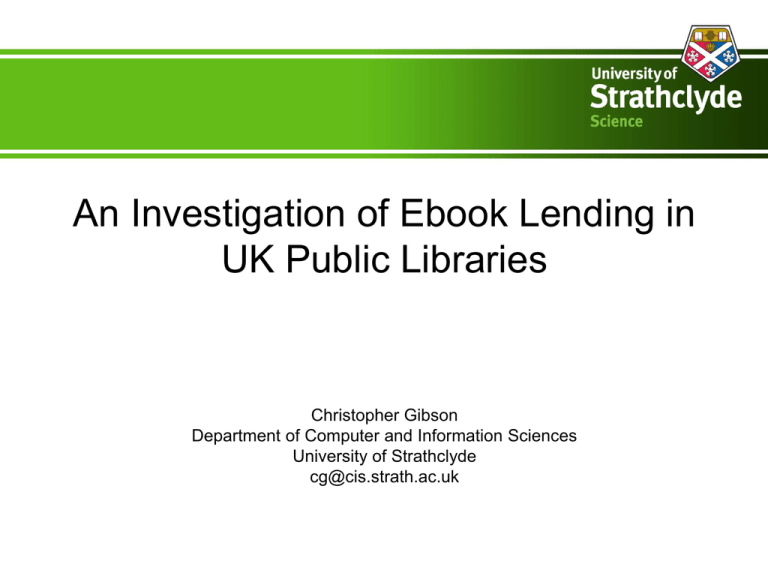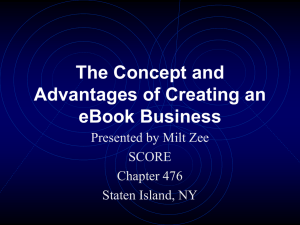GIBSON
advertisement

An Investigation of Ebook Lending in UK Public Libraries Christopher Gibson Department of Computer and Information Sciences University of Strathclyde cg@cis.strath.ac.uk Introduction • Study took place late 2011 to early 2012 • Few public libraries providing ebook lending services • Looking to chart the scale of ebook lending and look at the various lending models • Research questions • Methodology • Key findings • Conclusions • Future work Research questions 1. What are the current methods and models of ebook delivery that have been chosen by public libraries and why have these methods and models been adopted? 2. What is the scale and scope of ebook lending in UK public libraries? 3. What are the challenges that public libraries face when delivering ebook services? 4. How can an effective ebook service be developed? Methodology • Four phase pragmatic mixed-methods approach to investigate ebook lending in UK public libraries: 1. 2. 3. 4. Website survey Questionnaire FOI (Freedom of Information) requests Interviews with professional and para-professional staff in five Scottish public library authorities 1. Website survey • Surveyed 204 UK library authority websites • Established first look at ebook lending services in UK public libraries • Examined how ebook lending services were presented online • Identified third-party aggregators Key findings – website survey • As of September 2011 38% of library authorities in UK were lending ebooks at this time (compared with 8% in 2010) • Mix of third-party aggregators – OverDrive a clear market leader • 10 library authorities offered ebook lending from more than one aggregator • Majority of websites run by local council with varying degrees of “discoverability” of ebook services – 5% ran own website • Majority of libraries did not have ebook content integrated into OPAC 2. Questionnaire • Questionnaire was sent to 204 library authorities • Completed questions for either lending or non-lending • 99 completed questionnaires returned - 54 lending 45 non-lending Key findings - questionnaire Lending • No libraries had “special groups” for ebook use • One library charged for ebook lending, 9 others said they were considering charging • 22 of 54 offered training for library users, most common method was drop-in sessions • No libraries offered loans of ebook reading hardware • 28 saw lending models as unsuitable • Strong agreement, 49 from 54 that lending ebook was part of core public library remit Key findings – questionnaire Non-lending • Majority of libraries that weren’t lending were considering doing so • Libraries had multiple reasons for not offering ebook lending services: 1. Expense 2. Unsuitable lending models 3. No choice of aggregators 4. Lack of titles 5. Lack of demand 6. Lack of Kindle support 7. Drain on staff time 8. IT issues 3. FOI • FOI requests sent to 199 library authorities • FOI designed to look at: 1. 2. 3. 4. 5. 6. usage levels costs terms of contracts consortium arrangements unauthorised access steps taken to comply with disability equality duty FOI – Key findings • People don’t like getting FOI requests! • 145 libraries of the 204 (71%) lent either ebooks or audiobooks online • 111 authorities used a single aggregator, 28 used two, 5 used three, and one used 4 • OverDrive was still the market leader • Data was returned from all 199 authorities although some data was deemed to be commercial confidential • Average length of contract was three years FOI – Key findings • Average number of ebooks held was 600-700 although some authorities held less than 100 and others over 2500, this was correlated with library authority size • Average number of loans was between 200 -300 per month, this data was difficult to extrapolate as libraries conflated ebook and audiobook loans • Average spend was £12,000 per year but this varied greatly and 35 authorities did not release the information due to commercial confidentiality • No libraries reported being aware of unauthorised access • Small number of libraries, 11, had done impact assessment under public sector equality duty 4. Interviews • Interviews undertaken in five library authorities in Scotland beginning in January 2012 • A mix of urban and rural library authorities • Interviews with professional staff lasted approximately one hour • Interviews with para-professional staff lasted approximately 15 mins and took place in branch libraries Interviews – Key findings • • • • • • • Lack of titles – difficulty in purchasing titles Unwillingness to promote offer Duplication of effort – IT problems, advertising Varying levels of staff “buy in” Had to tighten joining procedures Problems delivering training – lack of wifi facilities Problems lending ebook readers – service sometimes as elitist as users without access to hardware are excluded • No contact with users of service / problems collecting data Conclusions • Public libraries delivering ebook content in a homogeneous manner • More lobbying to publishers needed – need to release more ebooks for public libraries to lend • More contact with users of service • Loan of hardware to special groups and public • Consortia?– eBooks for Wales model? Or perhaps something more radical? Future work • How can public libraries lend ebook reading hardware? • What would be the benefits and potential problems for a national consortium? • What happens to ebooks when contracts with aggregators expires and is not renewed? • Would it be possible to have own platform for lending ebooks? Questions?



